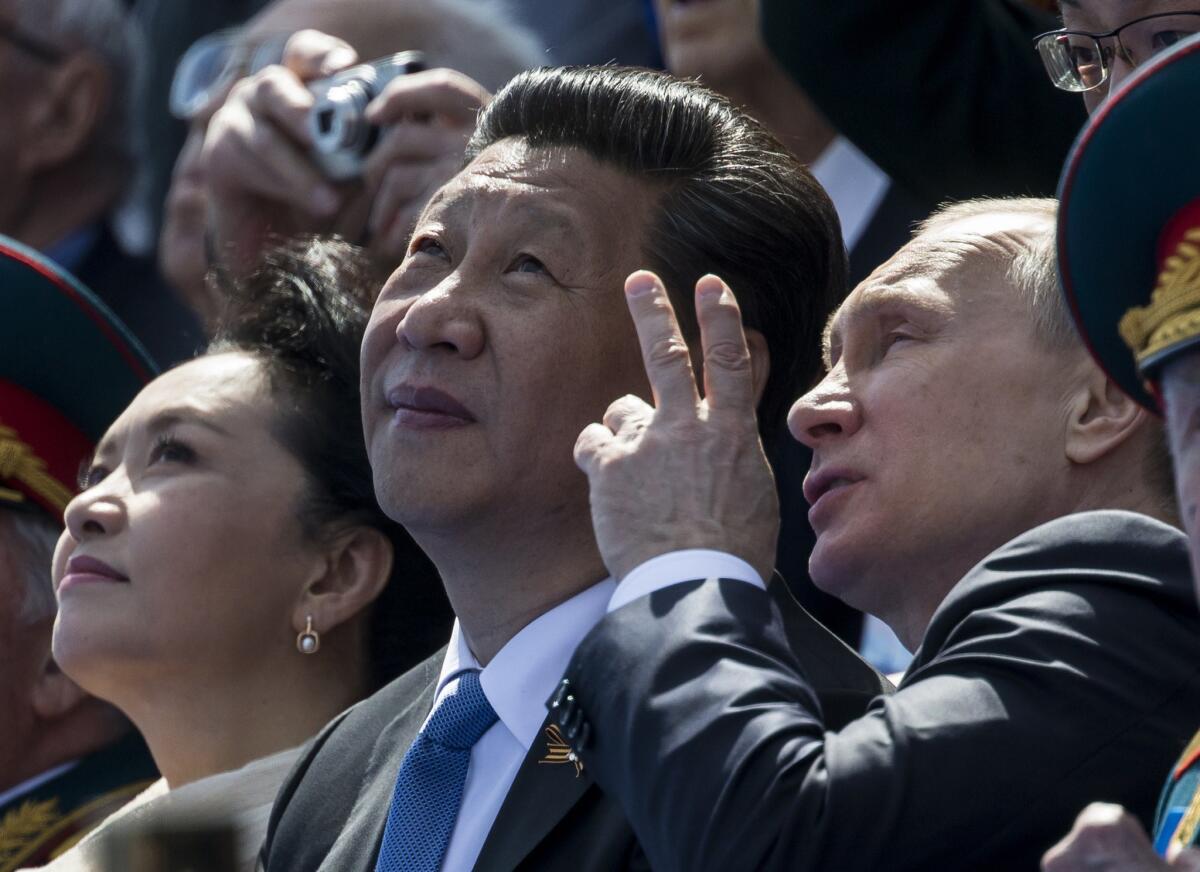Op-Ed: China’s ‘slow-motion revolution’ has stalled

Russian President
- Share via
Whatever happened to the Chinese revolution?
Not the dynasty-toppling 1911 revolution. Not the Communist-led 1949 uprising. Not the 1989 struggle, sometimes called an abortive revolution, which was crushed by a massacre on June 4.
No, the revolution we have in mind is a very recent one, which the journalist Ian Johnson, in his 2005 book “Wild Grass,” memorably called a “slow-motion revolution.” At the turn of the millennium, it looked as though China was moving gradually, sometimes glacially, toward becoming a more open — as opposed to just more prosperous and powerful — country. China’s rise continues. But that slow-motion revolution has been stopped in its tracks.
Johnson’s claim was not that of a starry-eyed fantasist convinced that China was predestined to become Americanized. He simply envisioned a China where, from year to year, there would be fewer limits on what one could talk about, and more ways to expose official malfeasance and gain redress for basic grievances. He documented the small-scale but substantive gains being made by brave rights lawyers, moderate civil society activists and envelope-pushing journalists who strove not to overturn the Communist Party but to get it to do a better job of living up to its professed goals.
As recently as 2009, this slow-motion revolution still seemed alive. The party did tighten control in 2008 as it strove to ensure that the Olympic Games went well. And the party always dealt ruthlessly with organized challengers. But the watchword was, as a bartender summed it up to one of us: Meiyou yundong, shenme dou keyi — if it isn’t a movement, anything goes.
Writing in 2009 to mark the June 4 anniversary, Lijia Zhang, who marched in 1989, described the situation well. Twenty years before, she said, people like her had felt trapped “in a cage” and longed to be free. Since 1989, the bars of the cage had moved farther away. They knew that the cage still existed, but it was easier to imagine that it didn’t.
Today, however, the bars are closing in again. Many rights lawyers and moderate civil society activists have been jailed. In March, five feminists were summarily detained in Beijing with no legal process, solely for planning events publicizing the need for greater equality. Censorship of the Internet has increased. Chinese academics have been warned to watch what they say in class. They should not promote “Western values” or “threaten social stability” by talking about social inequities and historical mistakes made by the party.
These warnings, new to the current generation, have appalled and surprised some young intellectuals. Their elders, though, feel a depressing sense of deja vu. Some say to us, in effect, “We’re back to the 1980s, but without the hope we had then.”
What explains this shift?
Party leader Xi Jinping seems to believe he must stamp out all hints of dissent in order to save China from the instability that has beset various post-communist societies in Eurasia and post-authoritarian ones in the Middle East.
Above all, Xi is determined not to end up being China’s counterpart to Mikhail Gorbachev, a figure Chinese leaders disdain for allowing the Soviet Union to implode under his watch. Xi allegedly derided Gorbachev, in a speech given behind closed doors, for failing to be “manly” enough to take tough action when necessary a quarter-century ago — a contrast, presumably, to what the tougher Deng Xiaoping had done when ordering tanks to roll into Beijing in 1989.
As the journalist William Dobson argued in “The Dictator’s Learning Curve,” modern authoritarian rulers are intensely aware of the challenge their counterparts are facing, and they’re stealing from one another’s playbooks.
In the 1970s, Singapore’s leaders began appealing to traditional Confucian values while defending one-party rule and pushing for rapid development. Later, Deng’s successors Jiang Zemin and Hu Jintao echoed that strategy in China.
More recently, Xi and Russian President Vladimir Putin, who share a disparaging view of Gorbachev, have been drawing closer. It’s entirely possible that the former has tried to curtail Chinese feminist activities because he wants to nip in the bud the kind of problem the latter faced with Pussy Riot.
Xi’s efforts are popular in some Chinese circles. That’s in part because he’s not only moving against threats to the party (real and imagined) but also the party itself. Xi has pledged to remove notoriously corrupt officials, clean up messy bureaucracies and reinvigorate the party rank and file, all in the name of realizing the so-called Chinese dream of national resurgence.
But there’s another reason some in China accept Xi’s methods. A quarter-century ago, there was a widespread belief that Western ways had proved superior to Soviet ones in generating wealth and delivering social justice. The years since then have not been kind to this notion.
Beijing does not have to make up tall tales to cast the West in a negative light. It can just point to the disastrous invasions of Iraq and Afghanistan, the 2008 financial crisis, Eurozone economic anxieties, American legislative paralysis, the Edward Snowden NSA revelations and the latest police shootings. It is not just party pronouncements against Western values that inhibit Chinese activists from holding up the West as a model; our own faults and foibles are clear to see.
Timothy Cheek, of the University of British Columbia, is the author of “The Intellectual in Modern Chinese History.” Jeffrey Wasserstrom, of UC Irvine, is the author of “China in the 21st Century: What Everyone Needs to Know.”
Follow the Opinion section on Twitter @latimesopinion and Facebook
More to Read
A cure for the common opinion
Get thought-provoking perspectives with our weekly newsletter.
You may occasionally receive promotional content from the Los Angeles Times.










